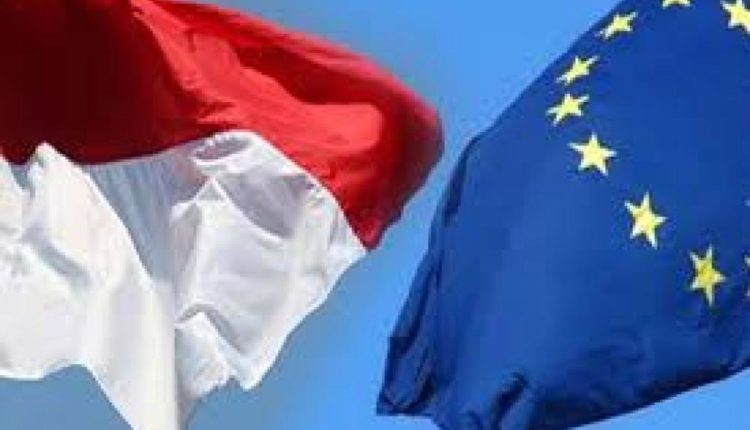Supporting Governments Against European Union Lawsuits
By: Aldia Putra )*
The Indonesian government banned nickel ore exports which triggered a European Union lawsuit to the World Trade Organization (WTO). Though the ban was issued to protect Indonesia’s domestic interests. The public is expected to join forces and support the Government’s efforts in countering the EU’s lawsuit.
The ban on nickel ore exports from Indonesia is enough to make the European Union beard fire. Because the use of this material in the European industrial sector is so crucial. The acceleration of this ban is suspected to make healthy and strengthen the industrialization of nickel ore in Indonesia, so as to be able to make a positive contribution in brazing the country’s treasury which is experiencing a trade balance deficit.
This is what underlies the filing of a lawsuit to the World Trade Organization (WTO). The European Union (EU) filed a lawsuit because the ban accelerated 2 years from its original plan, which began in early 2020.
Previously, the Government of Indonesia submitted a plan to stop the export of nickel ore as of January 1, 2020, two years earlier than the previously announced schedule. This step was taken to encourage the development of the domestic processing industry. As a result, nickel prices on the LME exchange managed to skyrocket to the highest level since 2014, at a nominal range of US $ 18,850 per ton in early September 2019.
Throughout the year 2019, the price of nickel futures for three-month contracts on the LME exchange will be able to strengthen by 60 percent, which is affected by the limited supply of products in the long run.
This decision is considered to add to the long list of pressure on the EU stainless steel industry. As is known, earlier came the weaker pressure due to the shake of the European car manufacturer industry, the US-China trade war to the plan to withdraw anti-dumping import duties by the United States.
In addition, the European Commission also has a plan to include Indonesian stainless steel within the scope of the EU import quota to prevent controversial US anti-dumping tariffs on foreign steel. For information, the US Department of Commerce has imposed import tariffs on structural steel in China and Mexico after learning that the two countries have sold manufactured structural steel to the US at prices below the market.
The EU is cautious about the imposition of US steel import tariffs, which has opened up opportunities for other countries to shift shipments to Europe so that it is predicted to inundate the Blue Continent market, which is struggling amid weak demand.
As stated by President Joko Widodo who has also instructed his staff, the Coordinating Minister for the Economy and the Minister of Trade to prepare the best team of lawyers when facing the EU lawsuit.
Meanwhile, Coordinating Minister for Maritime Affairs and Investment Luhut Binsar Pandjaitan detailed the reasons for the ban on nickel exports. Luhut said 98 percent of Indonesia’s nickel was exported to China. With this ban, it is hoped that a number of industries will be able to migrate to Indonesia. In addition, this policy was also taken in the framework of government programs related to electric vehicles that are being launched. Namely, nickel can be used for the electric vehicle battery industry.
The Head of the Investment Coordinating Board (BKPM) Bahlil Lahadalia talks about the export of nickel ore which will stop starting January 1, 2020. For entrepreneurs who are considered to have met the requirements are still allowed to carry out exports until December 2019, after that the export of nickel ore is cut completely.
Quoted from the Ministry of Industry website, nickel is one type of metal that has the nickname “the mother of industry”, meaning that this metal acts as the backbone that will support other industrial sectors, for example in the automotive field. According to the book “Indonesian Nickel”, the final nickel product is very much used for the manufacture of stainless steel, which is 6.9 percent. 10 Percent is used for non-iron alloys. Then 7 percent for plating (6%), 6 percent for making batteries and others. Including 3 percent is used for casting activities.
No wonder the EU was in chaos hearing this news. The supply of nickel which is considered as the core material for the running of the industrial wheel will stop and affect a number of sectors. However, the government’s attitude to decide on the acceleration of the cessation of nickel ore exports is not without reason. In addition to protecting nickel ore from foreign exploration practices because nickel reserves in the archipelago are running low, it is also to improve the trade balance deficit.
This effort should be appreciated and supported. Do not necessarily be beaten because of being pushed by the EU lawsuit. The support of all the people of Indonesia is allegedly also able to help strengthen Indonesia in the face of the International to protect the Mother Earth from damage caused by the exploitation of its Natural Resources. Forward, Mr. Jokowi, we support you!
)* The author is a social political observer
